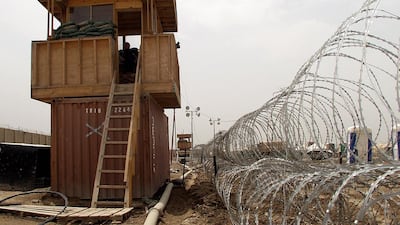A judge has ordered jurors to keep deliberating after they said they were deadlocked in a lawsuit alleging a Virginia-based military contractor is liable for abuse suffered by inmates at Abu Ghraib prison in Iraq two decades ago.
The eight-person civil jury has deliberated for the equivalent of three full days in the civil suit in the US District Court in Alexandria.
The trial, which began April 15, is the first time a US jury has heard claims of mistreatment brought by survivors of Abu Ghraib.
Suhail Al Shimari, Asa'ad Zuba’e and Salah Al Ejaili, who were released without charge from Abu Ghraib in 2004, are seeking punitive damages from CACI Premier Technology.
Contractors employed by CACI are accused of torturing and abusing the men during their detention.
CACI supplied civilian contractors to work at Abu Ghraib as interrogators, in support of short-handed US soldiers.
Abuse of detainees at Abu Ghraib became a worldwide scandal 20 years ago when photos became public showing US soldiers smiling and laughing as they inflicted physical abuse on detainees.
The plaintiffs have argued at trial that CACI interrogators contributed to their mistreatment, even if they did not commit the abuses themselves, by conspiring with soldiers to mistreat inmates as a way to “soften them up” for questioning.

This suit was filed under the Alien Tort Statute, which gives federal courts jurisdiction over lawsuits filed by foreign citizens for acts committed in breach of international law.
On Friday, the jury sent out a note saying that they had extensively discussed the evidence but “are still not unanimous on anything”.
As is typical when a jury sends out such a note, US District Judge Leonie Brinkema told the jurors they must continue their deliberations.
Ms Brinkema sent them home early on Friday afternoon to resume deliberating on Monday.
During deliberations this week, the jury asked several questions about how to apply a legal principle known as the “borrowed servants” doctrine.
CACI, as one of its defences, has said it should not be liable for any misdeeds by its employees if they were under the control and direction of the army.
The plaintiffs' lawyers tried to bar CACI from making that argument at trial, but Ms Brinkema allowed the jury to consider it.
Both sides have argued about the scope of the doctrine.
Fundamentally, though, if CACI has proven that its interrogators were under the command and control of the army at the time any misconduct occurred, then the jury has been instructed to find in favour of CACI.
Lawyers for the plaintiffs introduced evidence including CACI’s contract with the army, which required the company to supervise its own employees.
Jurors also saw a section of the Army Field Manual that pertains to contractors and says that “only contractors may supervise and give direction to their employees”.
“This case is part of our effort to bring accountability for torture and other serious violations of international law arising out of the so-called war on terror and invasion of Iraq,” the Centre for Constitutional Rights, whose legal team is representing the Iraqi plaintiffs, said in a statement before the trial was due to begin.
“Our clients are Iraqi civilians who were ultimately released without ever being charged with a crime.
“They all continue to suffer from physical and mental injuries caused by the torture and other abuse they endured.”

